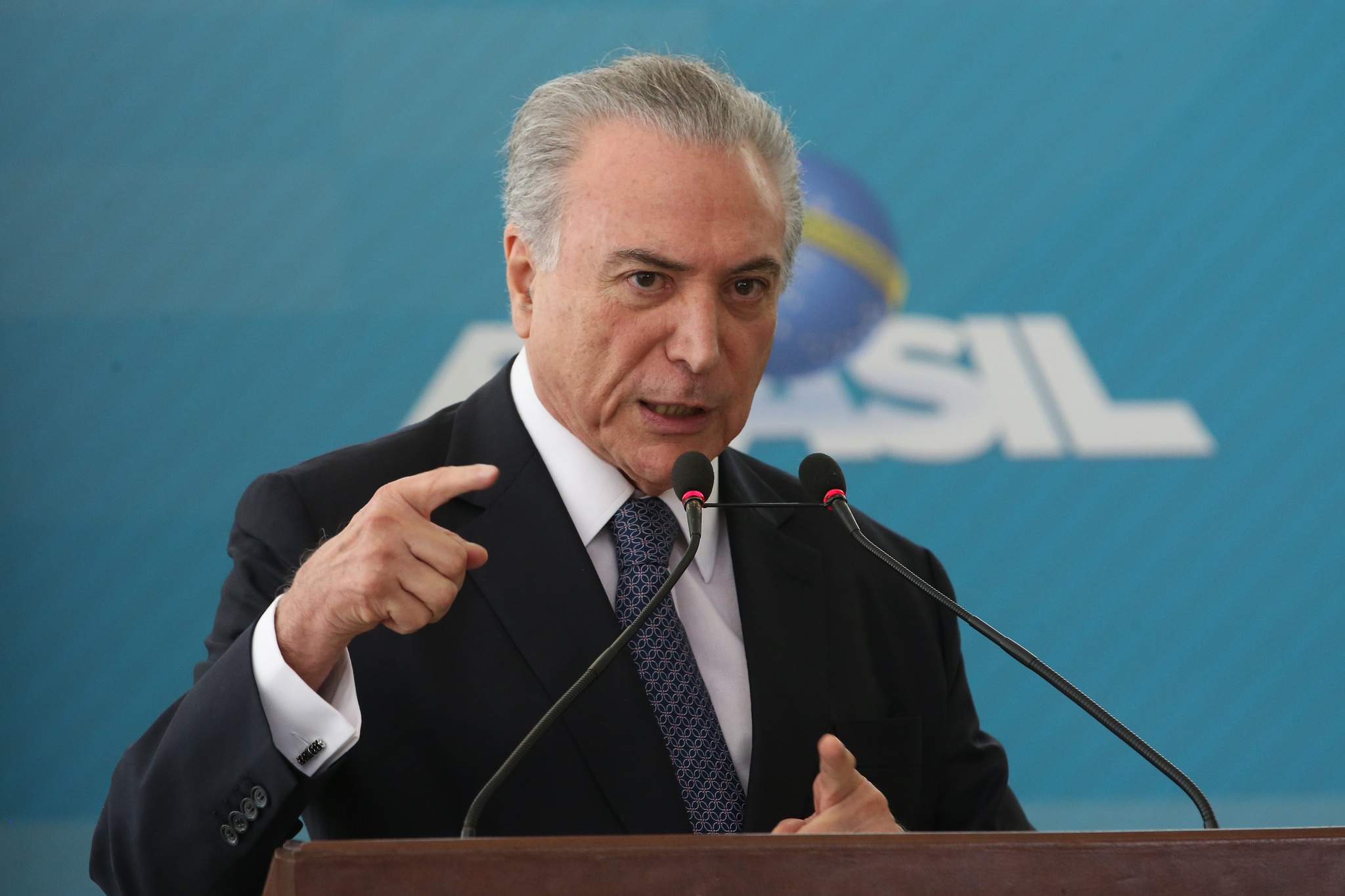News
Ex exec: paid millions in bribes to Brazil president’s party

Michel Temer is not under investigation since, as president, he has temporary immunity from any crimes committed before he took office. (Photo by Agência Brasil Fotografias/Flickr, CC BY 2.0)
SAO PAULO—Brazilian construction giant Odebrecht paid $40 million to President Michel Temer’s party and another party to ensure a contract with the state oil company, according to testimony from a former Odebrecht executive.
Marcio Faria’s accusation came in plea bargain testimony released late Wednesday as part of the biggest corruption probe in Brazil’s history.
The investigation, known as Operation Car Wash, has already unveiled billions of dollars in kickbacks and bribes paid to politicians by Brazilian companies.
But this week, the Supreme Court announced a new wave of investigations into top politicians, including eight of Temer’s Cabinet ministers, dealing a major blow to his presidency and raising questions about whether he can continue to effectively govern. In opening the investigations, the court released recordings of the plea bargain testimony that underpins the probe.
Other former Odebrecht executives testified that Temer was involved in the solicitation of another bribe, worth $3.2 million.
Temer is not under investigation since, as president, he has temporary immunity from any crimes committed before he took office. He has denied wrongdoing.
In his testimony, Faria said he met with Temer and some of his allies at Temer’s office in Sao Paulo in 2010 in order to “bless” an arrangement whereby Odebrecht would make a contribution to the Brazilian Democratic Movement Party in exchange for its help smoothing the approval of a pending contract with Petrobras.
When asked whether it was clear that this money was a bribe or an illegal gain, Faria responded: “Totally an illegal gain because it was a percentage on top of the contract.”
Faria said no figures were discussed at the meeting, but the deal was clear: Odebrecht would pay the party 5 per cent of the value of the Petrobras contract. That amounted to around $40 million, he said.
Faria said Temer’s party later decided to cut in the Workers’ Party. At the time, Temer was the vice-presidential candidate on a ticket with Dilma Rousseff of the Workers’ Party as the presidential candidate. In the end, Faria said Temer’s party received 4 per cent of the contract’s total, and the Workers’ Party received 1 per cent.
In a video released on Thursday, Temer acknowledged that he had a conversation with Faria in 2010, but flatly denied the rest.
“I am not afraid of the facts. What disgusts me are lies,” Temer said. “The lie is that in this meeting I heard a reference to financial resources or shady business by the company with politicians. This never happened. Not in that meeting and not in any meeting in my public life.”
Two other former Odebrecht executives described a similar scenario they say occurred in 2014. According to court documents, the executives had dinner that year with Temer, who was then vice-president, and his current Chief of Staff Eliseu Padilha.
During the dinner, they say, the company agreed to pay $3.2 million in supposed campaign contributions to Padilha and another Temer ally and in exchange, Temer’s party agreed to help Odebrecht win airport concessions. Padilha is under investigation in this case.
Former Odebrecht CEO Marcelo Odebrecht, one of the executives present, testified that he closed the deal with Padilha after dessert and before coffee was served. Temer had stepped away from the table at the time.
“Temer never mentioned the 10 million (reals, or $3.2 million) to me,” Odebrecht said in the recording released by the court. “But obviously at the dinner he was aware.”
Padilha has denied wrongdoing. Temer’s office said that he “categorically denies any involvement of his name in shady dealings.”
The corruption unmasked by the Car Wash investigation has shocked even the most cynical Brazilians for both the vast amounts that traded hands and the way in which it has spared no party. Odebrecht testified that his company also contributed to the presidential campaigns of Rousseff and Luiz Inacio Lula da Silva, both of the Workers’ Party, in exchange for favours.
In one instance, in 2009, Odebrecht met with Silva’s finance minister, Guido Mantega, to discuss an executive order the company wanted from the government. During the conversation, Mantega allegedly wrote down the number 50—which Odebrecht said he understood meant the company should contribute 50 million reals ($16 million) to Rousseff’s upcoming campaign.
“On illegal campaign financing, Lula and Dilma knew the amounts,” the former CEO testified. “Not the precise amount, but they had knowledge of the dimension of all our support through the years.”
Silva and Rousseff have both denied the accusations. Rousseff was impeached and removed from office last year on charges she broke fiscal laws.
“I don’t know what will happen to me, but I am fighting and I will prove that this country can be happy again,” Silva said in a radio interview on Thursday.





















